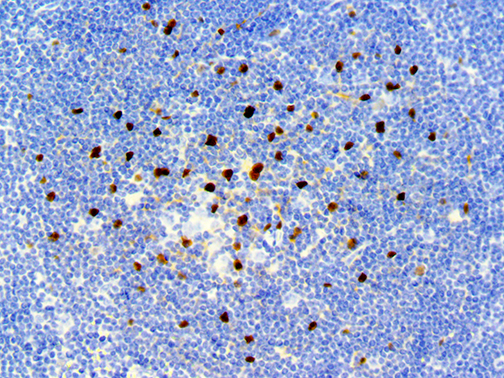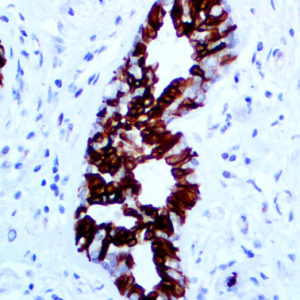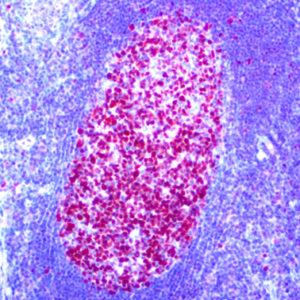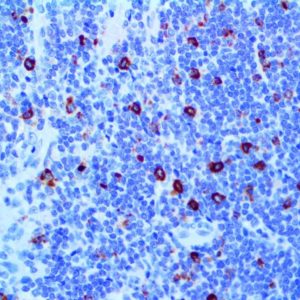
IHC of SOX-9 on an FFPE Lymph Node Tissue
| Intended Use | For In Vitro Diagnostic Use | |||||||||||||||||||||||||||||||||||
| Summary and Explanation | Transcription factor SOX-9 is a protein that in humans is encoded by the SOX9 gene. SOX9 acts during chondrocyte differentiation and regulates transcription of the anti-Müllerian hormone (AMH) gene. It is expressed during embryogenesis, in the cartilage, neural crest, kidney, and pancreas. SOX-9 plays a pivotal role in male sexual development, interacts with a few other genes to promote the development of male sexual organs and its activity is also required for development, differentiation, and lineage commitment in various tissues including the intestinal epithelium. SOX9 exhibits several pro-oncogenic properties, including the ability to promote proliferation, inhibit senescence, and collaborate with other oncogenes in neoplastic transformation. Human colorectal cancers show a positive correlation between expression levels of SOX9 and BMI1 and a negative correlation between SOX9 and ARF in clinical samples. In normal colorectal mucosa, SOX9 expression is found predominantly to the lower part of crypts, the proliferative compartment and putative site of stem cells, suggesting SOX9 as a putative stem or progenitor cell biomarker. Recent studies have shown the overexpression of SOX9 in solid tumors. Compared to normal tissues, immunohistochemical analysis revealed staining that is more intense and widespread staining in many cancer types, including but not limited to, Gastric carcinoma, Non-Small Cell Lung Cancer (NSCLC), Lung Adenocarcinoma, Prostate Cancer, Breast Carcinoma, Pancreatic Ductal Adenocarcinoma, Glioma, Colorectal Cancer, Hepatocellular Carcinoma (HCC) and Ovarian Cancer. Amplification of 17q24.3, the chromosomal region of SOX9 has been found in Prostate, Neuroblastoma, Medulloblastoma, Breast and Ovarian Cancer, which all exhibit high SOX9 expression. Although staining is predominantly nuclear, cytoplasmic SOX9 may serve as a valuable prognostic marker for Invasive Ductal Carcinomas and Metastatic Breast Cancer. Additionally, SOX9 upregulation has been associated with higher tumor stage and grade, and overexpression has been recognized as an independent prognostic marker for decreased survival in Colorectal Cancer, NSCLC and HCC patients. In Pancreatic Cancer, SOX9 has been found to regulate the EGFR pathway throughout pancreatic tumorigenesis. | |||||||||||||||||||||||||||||||||||
| Antibody Type | Rabbit Monoclonal | Clone | EP317 | |||||||||||||||||||||||||||||||||
| Isotype | IgG | Reactivity | Paraffin, Frozen | |||||||||||||||||||||||||||||||||
| Localization | Nuclear | Control | Colon, Prostate, Skin, Breast, Tonsil, Lymph Node, Colon Carcinoma | |||||||||||||||||||||||||||||||||
| Presentation | SOX-9 is a rabbit monoclonal antibody derived from cell culture supernatant that is concentrated, dialyzed, filter sterilized and diluted in buffer pH 7.5, containing BSA and sodium azide as a preservative. | |||||||||||||||||||||||||||||||||||
| Availability |
| |||||||||||||||||||||||||||||||||||
| Note: For concentrated antibodies, please centrifuge prior to use to ensure recovery of all product. | ||||||||||||||||||||||||||||||||||||



